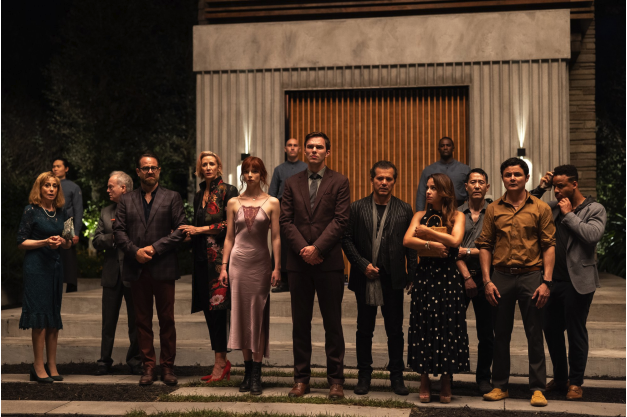David Lynch (1946-2025) : Poet Of The Unseen
Sometimes, it almost feels like a form of manifestation, looking back at a beloved inspiration's extensive body of work. Perhaps this sensation I’ve been almost continuously experiencing has been with me ever since we lost David Bowie, where suddenly old anxieties about mortality seep into everyday musing and conversation. This is especially impactful when the marathoning and celebrating occurs mere weeks before the subject of all this love and re-examination exits the stage. Sure, they weren’t making anything as grand as an album or a film, but the feeling that in their own private way, they continued to weave their spirit into new and illuminating ways at home, out if public view. Which is perhaps why after several hours of seeing the news across social media that multimedia artist, and cinema surrealist, David Lynch had indeed departed our world, that the weight of it has yet to truly hit my chest like so many others.
This is especially puzzling as few artists have impacted every corner of my waking creative life quite like he has, and perhaps will continue to long after all of this.
A relationship that began the moment I first saw print ads and then posters for The Elephant Man (1980) in newspapers and just outside a local movie house. The black and white image of the wrapped, and mysterious shape of John Merrick as it defied any easy discernable concept of a recognizable human being. Even so, a haunted beauty that seemingly saw this unusual shape as host to what I would later grow to love and better understand. That the teller behind this story was fascinated by humanity's need for established normalcy in spite of nature’s endless curves and bends beyond said need. That there was grace and even stirring poetic soul within the surface abject, perhaps with a bevy of long neglected questions regarding our shared yearning and belief in a larger, more encompassing universe.
And when his ill-fated adaptation of DUNE (1984) enraptured my mind regardless of its often misshapen story threatened to careen into utter incoherence, it was clear that this was a storyteller not so much interested in the instantaneous, and more on the distended pause after a door closes, the lingering that we occasionally partake of our surroundings only to realize we’ve been too lost in thought to recognize what exactly we were looking at. Weaving in and out of perspectives not unlike the ways dreams can occasionally bleed into new and tonally powerful states of being and awareness.
So when Blue Velvet, and later Twin Peaks hit the scene, it had finally felt like a more concrete identity had taken shape, not to mention evoked questions within me about the community I grew up in. A place that could not be more opposed in atmosphere, but with a surreality, and social shape of its own complete with secrets and legends lying seemingly dormant to many of us. It was clear by this point that his worlds and characters, even as they recalled aesthetics and iconography that laced my parents’ childhoods, there was a bridge forming that bridged childhood innocence comfortably alongside adult horrors and hushed passages with sights and sounds that felt raw, immediate, mainlined straight from the unfettered unconscious.
Whether it be David Lynch the filmmaker, David Lynch the painter and visual artist, David Lynch the musician, or even David Lynch the askew public persona with his many tales of inspiration and his message about the unbridled power of ideas, there was always something to delve deeper, beyond the tactile materials of his works that imbued me with the means to dream, to muse, and to view the world in ways perhaps my ancestors were more attuned to receiving as the society I grew up in possessed only so much room for magical realism and existentialism beyond the printed word. The impacts upon my personal life continue to be profound, and continue to reveal themselves the more I ruminate through this piece. Which makes me think I may need a larger canvas to better elaborate one day.
But I will also wholeheartedly celebrate and continue to ruminate and feel not only his work, but the vision, drive, and character of a man so beloved by so many friends and family of collaborators who helped his voice become what it has through many hurdles and processes. There is a genuine essence of life here in the story of this person who has touched the hearts and hungry minds of so many, that to summarize it all here in one post can only be impossible. Without him, I wouldn’t be so into Jodorowsky, Bunuel, Roeg, Russel, Deren, and so many others. Heck even my appreciation of Wilder might not be as prevalent without him, not to mention my lifelong love of the arts as a whole. In a great many ways, his work is an active overture for seeking more from creatives, including questions, social & self-interrogation, satire, and most importantly, a space to further contemplate and explore without barriers of language or reason to hold us rigid. Because more than anything else, his vision was that of an unencumbered mind, a beacon reminding us that our rational minds are themselves the product of market interests that require us to be unquestioning worker bees. And that we too are capable of incredible things if we simply listened a little closer to that distant inner speech we all possess.
For all of these things, and so much more to discuss & create, I will remain eternally grateful. A once in a lifetime mirror to our shared inner humanity. From beauty to disquiet. It’s all there for us. He was merely here to remind us that it was always here to help. That the totality itself is beautiful. And that alone is cosmically noble in ways I continue to process to this very hour.
Not bad for a scientist’s son from Missoula, Montana..










